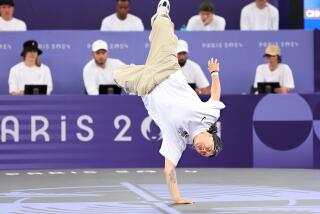THE SEOUL GAMES / DAY 9 : East German Star’s Winter of Gold Is Followed by a Summer of Silver
- Share via
SEOUL — The myth of female frailty dies hard, nowhere more so than in the Olympic Games, where for decades the only women’s event was victory-dinner cooking.
Through the first 88 years of the modern games, for example, females were deemed too delicate to be allowed onto bicycles, unless they were carrying parasols and picnic lunches.
In 1984, the year of the first female Olympic marathon, the first women’s bicycle road race was also held.
This year the lords of Olympus, grinding slowly the wheels of progress, let the female cyclists venture into the treacherous concrete pit of the Seoul velodrome, and the result was a ride that fell just 2 feet short of qualifying as Olympic lore, a near-miss performance for the ages.
Christa Rothenburger-Luding of East Germany, who last February won the gold medal at Calgary in 1,000-meter speed skating, Saturday night cycled to a silver medal in the 200-meter match sprint event.
She came from behind to win the first race of the best-of-three showdown against Soviet speedster Erika Salumae, but Salumae narrowly won the next two sprints and the gold medal.
And wherever he was, Edward Eagan--who later became known in boxing circles as the venerable Col. Eddie--heaved a sigh of relief.
The colonel, no Eddie the Eagle-type Olympic buffoon, remains the only person in the history of the Games to have won gold medals in the both the Winter and Summer Olympics. The Yale graduate won the light-heavyweight boxing gold medal in 1920 at Antwerp, Belgium, then sat in with the winning U.S. 4-man bobsled team at Lake Placid, N.Y., in 1932.
Christa could have wiped Eddie the Eager out of the books. Her double gold would have been won in the same year, and in two events that require the competitor to actually move his or her body.
Not to demean Eagan’s accomplishment, but a bi-seasonal gold in the modern games, in two sports that demand grueling, year-round training, would have nudged the colonel off his prestigious shelf.
But shed no tears for Christa, who accepted her narrow defeat with Olympian class.
“All I can say, is I am very happy with what I have achieved, and I like it,” she said.
Taking a beating in the postrace press conference was the myth that athletes of the GDR do not show emotion.
With a smile that would light up a Wheaties box, if only she were American and if only she had won, Christa graciously saluted the victor.
“It would have been fantastic to win the gold medal,” the 28-year-old Rothenburger-Luding said. “But it was not possible. She was stronger and more experienced and she won the victory. I am very happy for her.”
If the decathlon champion is the world’s greatest athlete, then surely the 5-foot 6-inch, 132-pound Christa has invented a subspecies of superlative--world’s most amazing legs. To compete so successfully in a winter power sport and a summer power sport is heretofore unheard of.
Rothenburger-Luding is primarily a speed skater, having competed on ice since she was 14. By age 20, she was the East German sprint champion and at the 1984 Olympics she won the speed skating gold medal at 500 meters. In 1988 at Calgary she added a gold medal in the 1,000 meters and a silver in the 500.
Then Christa put her mettle to the pedal and immediately began training for Seoul, taking time out in April to marry her coach, Ernst Luding.
The sprint-cycle gold medal was a not-so-impossible dream. Rothenburger won the match sprint world championship in 1986 at Colorado Springs, Colo., in her first international cycling competition, but was narrowly defeated by Salumae last year in Vienna.
Thus neither woman was a clear favorite going into Saturday’s ground-breaking women’s Olympic race.
The cycle sprint is a misnamed event, since it is as much a poker game on wheels as it is a pure sprint. Bluffing and peeking and masking one’s emotions are skills as vital as pure leg drive.
The race is 3 laps around the steeply-banked oval, but the first 2 1/2 laps are cat and mouse, agonizing slo-mo cycling that occasionally becomes freeze-frame as both cyclist stop dead on their wheels and stare one another down.
When world superstar Lutz Hesslich, whose game face is cold as stone, was stalking Soviet cyclist Nikolai Kovche in their gold-medal race Saturday, you could almost hear the theme music from “Jaws” in the background.
Sure enough, Hesslich took advantage of an eye-blink mental lapse by Kovche to bolt past the Soviet in a move as ruthless as anything you’ll see at a bullfight.
This is the esoteric part of the event that only true cycle fans and competitors understand.
And this was the downfall of Christa, who in the words of the American bronze medalist, Connie Paraskevin-Young, “is more of a drag racer--she just gets out there and goes.”
Christa, wearing a crash helmet that looks like something out of the 1950 Detroit Lions’ equipment bag, apparently made her move a bit too soon in the second and third heats, Salumae drafting along and edging half a wheel length ahead at the finish line both times.
Then Christa smiled the most dazzling loser’s smile of the Games, hopped onto her street bike with her medalist’s bouquet resting on the handlebars and her husband riding at her side, and pedaled off toward the Olympic Village.
Old Eddie the double-gold Eagle remained alone on his unique winner’s podium, but the concept of noble Olympian defeat had itself another champion.
More to Read
Go beyond the scoreboard
Get the latest on L.A.'s teams in the daily Sports Report newsletter.
You may occasionally receive promotional content from the Los Angeles Times.







